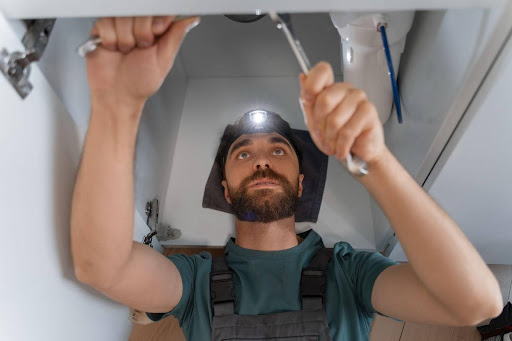When temperatures plunge, the risk of pipes bursting in your home increases significantly. This can cause extensive water damage, leading to costly repairs and potential health hazards from mold growth. As homeowners in Athens, Georgia, we need to be particularly vigilant during the colder months to ensure our homes are safeguarded against these risks.
At Sentry Restoration, we specialize in addressing water damage emergencies caused by burst pipes due to freezing conditions. Our team is well-versed in water mitigation techniques and understands the importance of acting quickly to minimize damage. Being prepared and knowing how to react can save your home from severe water damage, making it essential to understand why pipes burst in the first place and what preventative measures can be taken.
In this article, we’ll delve into the reasons freezing temperatures cause pipes to burst and outline practical steps you can take to protect your home. We’ll also guide you on how to recognize pipes at risk and what immediate actions to take if you encounter a burst pipe. Following these guidelines not only helps prevent emergencies but also ensures a swift and efficient response to water damage.
How Freezing Temperatures Affect Pipes
When temperatures drop, water inside your pipes can freeze. Water expands as it turns into ice, putting significant pressure on the pipe walls. This pressure can cause pipes to crack or burst, leading to water damage in your home. In areas like Athens, Georgia, where sudden temperature changes can occur, having exposed or poorly insulated pipes makes your home more vulnerable to this issue.
Another factor to consider is that when water freezes and creates a blockage in the pipe, water pressure builds up behind the ice blockage. This increased pressure has no escape, putting strain on the entire plumbing system. The pipe will eventually burst at its weakest point, releasing large amounts of water into the home. Understanding how freezing temperatures impact pipes helps in taking preventative measures to protect your property.
Signs Your Pipes May Be at Risk
Recognizing signs that your pipes may be at risk can help you act before a pipe bursts. One major sign is reduced water flow. If you notice that the water pressure is lower than usual, it might indicate that ice is starting to form inside the pipes. Additionally, unusual sounds like banging or clanking when you turn on the faucet can signal issues with water flow due to ice blockages.
You should also look for visible frost on pipes, particularly those in unheated areas like basements or attics. Frost on the outside of a pipe suggests that the water inside is freezing. Pay attention to any strange smells coming from your faucets or drains, as this could indicate a crack in the pipes where contaminated water is leaking. In Athens, Georgia, keeping an eye out for these signs, especially during cold spells, allows you to take quick action to prevent a burst pipe.
Steps To Protect Your Pipes From Freezing
Protecting your pipes from freezing involves several proactive steps. First, insulate your pipes, especially those located in unheated areas like basements, attics, and garages. Pipe insulation foam is affordable and easy to install, offering a simple solution to keep your pipes warm.
Next, seal any gaps or cracks in your home’s exterior walls, as cold air can seep in and affect the temperature of the pipes. Caulk or weatherstrip around windows and doors to keep the cold air out. Also, keep your home’s temperature consistent. Set your thermostat to the same temperature during both day and night to ensure constant warmth.
During especially cold periods, let faucets drip slightly. This small flow of water helps prevent the pipes from freezing. Open cabinet doors under sinks to allow warm air to circulate around the pipes. These simple measures can make a big difference in preventing pipes from freezing and bursting, particularly in homes in Athens, Georgia.
What To Do When Your Pipes Burst
If you discover a pipe has burst, act quickly to minimize water damage. First, shut off the main water supply to stop more water from entering the home. The valve is usually located near your water meter or where the main line enters the house. Turning it off reduces the water flow and limits the extent of flooding.
Next, turn off the electricity in the affected areas to avoid electrical hazards. Use towels, mops, or a wet/dry vacuum to remove standing water. Move furniture and valuables to a dry location to prevent further damage.
Once you’ve taken these initial steps, contact our team for professional assistance. Our team is skilled in handling water emergencies and can help mitigate the damage and restore your home. Remember, acting fast can save your home from significant damage and costly repairs. We are here to assist residents in Athens, Georgia.
Conclusion
Understanding why pipes burst in freezing temperatures and knowing how to prepare can prevent significant water damage to your home. By recognizing the signs that your pipes may be at risk and taking proactive steps to protect them, you can avoid many common issues. However, if your pipes do burst, knowing the immediate actions to take can minimize the extent of the damage.
It’s essential to address water damage promptly to prevent long-term problems like mold growth and structural damage. If you experience a burst pipe or any other water-related emergency, don’t hesitate to reach out for professional help. At Sentry Restoration, we are ready to assist residents in Athens, Georgia, with all their water mitigation and restoration needs. Contact us today for expert service and peace of mind.



